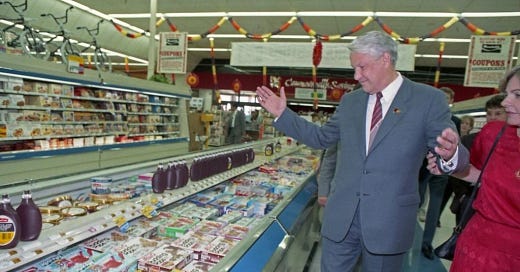Freedom is a particularly American political value, tied to our Constitution and our history as an expansionist and polyglot nation and our relatively free-market (anti-state) tradition. It is often discussed in the context of laws, or policies, or (even narrower) partisan debates: abortion, gun control, online speech.
It’s not that these things don’t relate to freedom-they do. But they are far too restrictive and contested to approach the real value and meaning of freedom.
Let’s do it this way: what do you enjoy? Christmas? dancing? graphic novels? surfing? trance? meditation? beaches? polyamory? cosmetology? astronomy? reading? road trips? marijuana? finance? running? investing? fashion? combat sports? arguing? gardening? THAT is freedom.
Economically freedom is the ability to trade your labor and your property willingly with other people in the market-that’s all it is-to buy and sell without punishment or restriction. It’s the right to approach a bank and get a loan for a business, to sell your car to a neighbor, to look for a new job in a new city, to apply to a university. It’s the right to become a barber or a teacher or a builder, if you can find someone to hire you. It’s the right to employ whomever you choose to work in your retail outlet or your restaurant or your concrete & masonry contractor.
Socialism is the opposite. Socialism is a situation in which ALL of these transactions, choices, and relationships are proscribed by the state. They are generally forbidden outright but those which are allowed are controlled by the government. Selling a car or moving into a new house or choosing a new profession outside of state control is punished with imprisonment, or death. Growing your own food and trading it for tobacco can earn you years of imprisonment. Free exchange (buying and selling and making free choices about your economic future) is simply not done. Socialism (at the state level) has been tried hundreds of times throughout history and it has always devolved thus, as the state grabs more and more power and restricts individual freedoms more and more. If it doesn’t get to this point, or if it begins to reform and open up, it disappears… collapses-to be replaced by a less centralized system.
People might tell you that socialism will create a new kind of society, or that it might abolish want, or inequality. History indicates otherwise-but let’s imagine these claims are true: is abolishing inequality a prize you’re willing to trade for the right to choose your job and your school and your home? Are you willing to let those decisions (as well as your grocery selections and your hobbies and your political loyalties) be determined by committee or command, by people of the same caliber as those who who now staff your typical DMV office or sell used cars? Is that a worthy bargain?
It’s easy to scoff at the superficiality and waste and commercialism of a free society… but such places are PROFOUNDLY preferable to those who have lived in both free and unfree societies. Freedom offers a range of options: you might end up homeless, or abused, or in de facto slavery to credit card companies (although public policy can ameliorate these conditions) but you might also build a thriving business or write a subversive film script… and in the meantime you’re able to enjoy far superior music and groceries and technology and clothing.
The contemporary disdain for freedom is similar to the disdain for police-it is a byproduct of a social reality so comfortable and successful that its inhabitants have forgotten essential truths about human nature and are disregarding important constituents of political order.
Ultimately, if you want the privilege of driving your car on a road trip and stopping in restaurants along the way, you cannot support socialism. This might seem like a false dichotomy or a simplification but the records of a century of bloody history supports my claim. Ultimately, if you enjoy managing your own life and working towards your own future, you must assent to political and economic freedom. Ultimately, political freedom only survives in societies which are educated and open enough to provide that promise to a great mass of its people. Ultimately this all rests on the ability to say the truth, as you see it, regardless of whether your words are deemed hateful or dangerous or antisocial by the powerful or not.
This is what I believe.





